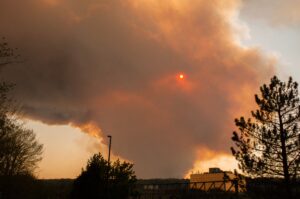 The still-raging Canadian wildfires —hundreds of which remain uncontained —have ravaged more than 25 million acres since June, according to the Canadian Interagency Forest Fire Centre. This has not only had severe environmental impacts on the immediate region and beyond but it has also caused economic ramifications as many sawmills operating in the affected areas have been forced to temporarily curtail operations out of safety concerns.
The still-raging Canadian wildfires —hundreds of which remain uncontained —have ravaged more than 25 million acres since June, according to the Canadian Interagency Forest Fire Centre. This has not only had severe environmental impacts on the immediate region and beyond but it has also caused economic ramifications as many sawmills operating in the affected areas have been forced to temporarily curtail operations out of safety concerns.
“It’s significant,” said Derek Nighbor, CEO of the Forest Products Association of Canada, in a release. The wildfires, he noted, have forced significant downtime at sawmills. “Closing mills and having to restart them is a lot of work, and that’s people who have to be laid off temporarily.”
Case in point is Quebec-based Resolute Forest Products, a leading producer of a diverse range of wood, pulp and paper products, which temporarily shut four local sawmills that primarily produce softwood lumber for clients across North America. These softwood products are often used for a variety of construction building materials, including—in some cases—the cores and backing layers utilized in some engineered flooring products.
“We’ve had to shut down sawmills in Quebec as some areas have been evacuated and our employees physically cannot be there to operate the machinery,” Louis Bouchard, director of public affairs and government relations at Resolute Forest Products, told BNN Bloomberg News. “It’s the worst I’ve seen in 30 years.”
Seth Kursman, vice president, at Resolute Forest Products, said it was premature to say if the company may need to declare force majeure—a condition whereby unexpected circumstances can prevent a business from meeting contract obligations—or if it would try to make up the lost production later in the year.
Suppliers weigh in
Floor Covering News spoke with several hardwood flooring producers with headquarters and factories in eastern Canada. Some said they have thus far been unfazed by the widespread destruction of softwood lumber caused by the wildfires. Some producers cite the fact that the top layer or veneers utilized in many hardwood flooring products comprise hard-wearing species like oak, maple and hickory, and not the softwood pine species that have been most impacted by the fires.
“The wildfires in Canada have had no impact on our overall manufacturing capabilities,” said Paul Rezuke, vice president, U.S. sales, Wickham Flooring, which maintains production facilities in Quebec.
Then there are those Canadian hardwood flooring suppliers that, while operating manufacturing facilities north of the U.S. border, actually source much of their veneers and logs from forests in the U.S. “We’re not affected by the soft wood burning up north, because everything that we source comes out of the U.S. market from Maine to Pennsylvania or even further south now,” said Wade Bondrowski, director of sales, USA, Mercier Wood Flooring, which is headquartered in Montmagny, Quebec. “Nor have the fires impacted our supply chain when it comes to our core materials, because we’re using a plywood backing and a Baltic birch core right now. In short, we produce in Canada but we don’t source from Canada.”
Fuel to the fire
The Canadian wildfires—which spanned from British Columbia all the way to the eastern part of Canada—come at a time when the local lumber industry was already facing challenges. Canada has the world’s third-largest forest area and is the second-largest softwood lumber producer, making it a key supplier of a critical housing material. Further constrained lumber supplies only exacerbate the situation.
“The Canadian lumber industry is already suffering from a supply issue,” John Duncanson, an analyst with Corton Capital, which follows the industry, told BNN Bloomberg News. “Timber has been impacted by disease and manmade policies that already put pressure on available supply. These wildfires will only make this worse.”
Given the current predicament, producers are unable to stock up supply as a future coping mechanism to wildfires as there are annual lumber cut limits in place, Duncanson noted. He said these pressures on supply will ultimately drive lumber prices higher.
(Look for more on this story in the next edition of FCNews.)
